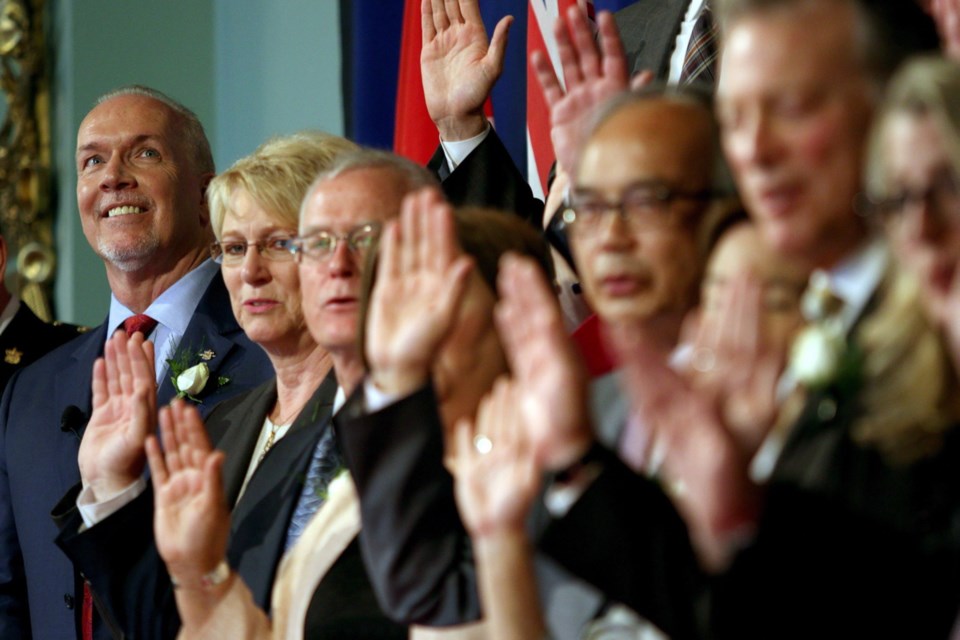Reforming campaign finance laws, freezing B.C. Hydro rates and developing 114,000 units of affordable housing are among the priorities Premier John Horgan has told his cabinet members to pursue.
Horgan’s mandate letters to his ministers were published Monday afternoon.
The letters, in many cases, reiterate NDP campaign promises and highlight priorities, including relief for families from rising costs and fees; improved health care and education; and good jobs and economic opportunity throughout the province.
They also remind ministers to make a priority of consulting with the Green Party on major topics, in line with the agreement the two parties reached before the NDP minority government was sworn in. “This agreement is critical to the success of our government. Accordingly, the principles of ‘good faith and no surprises,’ set out in that document should also guide your work going forward,” the letters say.
Some of the highlights:
• Melanie Mark, Advanced Education, Skills and Training: Eliminate fees for adult basic education and English-language learning programs; eliminate interest on B.C. government student loans and establish a $1,000 completion grant to provide debt relief to B.C. graduates.
• Lana Popham, Agriculture: Revitalize the Agricultural Land Reserve and Agricultural Land Commission.
• Rob Fleming, Education: Fast-track enhancement to K-12 education funding; review the funding formula to develop a stable and sustainable model for K-12 education; implement First Nations history curriculum.
• Carole James, Finance: Deliver a balanced budget; establish a task force that will endeavour to eliminate Medical Services Plan fees within four years, starting with a 50 per cent reduction on Jan. 1, 2018; improve housing affordability while reducing tax fraud and money laundering in the B.C. real estate market; increase carbon tax by $5 per tonne annually beginning April 1, 2018.
• Adrian Dix, Health: Establish urgent-care centres across B.C.; improve rural health services and expand the medical travel allowance; invest in more paramedics; reduce wait times; work with the federal government towards a national Pharmacare program.
• Claire Trevena, Transportation and Infrastructure: Work with B.C. Ferries to freeze and reduce fares, and reinstate the seniors’ weekday 100 per cent discount; eliminate tolls on the Port Mann and Golden Ears Bridges; accelerate Highway 1 upgrades to the Alberta border; secure federal funding for the Pattullo Bridge replacement and rapid transit in Metro Vancouver.
• Katrine Conroy, Children and Family Development: Reduce the number of Aboriginal children entering the care system, improve child-protection services; hire additional social workers and implement incentives to attract social workers to rural and underserved regions.
• Katrina Chen, Child Care: Implement a child-care plan that provides affordable and high-quality care and early learning to every child whose family wants or needs it, starting with infant-toddler programs; accelerate creation of new child-care spaces.
• David Eby, Attorney General: Introduce legislation to reform lobbying; to reform campaign finance laws to ban political contributions by corporations and unions and set limits on individual contributions; and to hold a province-wide referendum on proportional representation in the fall of 2018.
• Michelle Mungall, Energy: Freeze B.C. Hydro rates while conducting a review of the Crown corporation; ask the B.C. Utilities Commission to assess the economic viability of the Site C dam; require LNG proposals to guarantee B.C. jobs and training, provide a fair return, respect and partner with First Nations, and protect air, land and water.
• Judy Darcy, Mental Health and Addictions: Develop an immediate response to the opioid crisis; create a mental-health and addiction strategy, including a focus on improving access, investing in early prevention and youth mental health.
• Selina Robinson, Municipal Affairs and Housing: Begin to build 114,000 units of affordable market rental, non-profit, co-op, supported social housing and owner-purchase housing; provide stronger protection for renters; deliver an annual renter’s rebate of $400 per rental household to improve affordability; develop a homelessness action plan involving permanent housing and services.
• Mike Farnworth, Public Safety and Solicitor General: Lead planning for safe implementation of legalized cannabis.
• Bruce Ralston, Jobs, Trade and Technology: Ensure B.C. is an attractive place for investment in new and emerging technologies; increase the growth rate of domestic tech companies; work with Finance to cut the small business tax rate.
• Harry Bains, Labour: Establish a Fair Wage Commission to help implement a $15-per-hour minimum wage by 2021 and close the gap between the minimum wage and livable wages; create a registry for temporary foreign workers to protect vulnerable workers from exploitation.
• Lisa Beare, Tourism, Arts and Culture: Expand tourism-marketing efforts internationally; double investment in the B.C. Arts Council over four years; establish an arts infrastructure fund to help provide space for B.C. artists; develop a fund to upgrade and build sports facilities, playgrounds, community centres, and arts and culture spaces.
• Jinny Sims, Citizens’ Services: Cap the value and the length of government information technology contracts; make sure the contracting process works better for companies that hire locally; improve response times for freedom of information requests.
• George Heyman, Environment and Climate Change Strategy: Develop a climate-action strategy that includes a legislated 2030 carbon reduction target; increase the carbon tax by $5 per tonne per year, beginning April 1, 2018; defend B.C.’s interests in the face of the expansion of the Kinder Morgan pipeline; enact an endangered species law.
• Scott Fraser, Indigenous Relations and Reconciliation: Negotiate with First Nations to expand opportunities for their share of the gaming industry; transform the treaty process so it respects the United Nations Declaration on the Rights of Indigenous Peoples; help Indigenous communities connect with their languages.
• Shane Simpson, Social Development and Poverty Reduction: Raise earnings exemptions for people on assistance by $200 a month; restore the B.C. Bus Pass program; test whether giving people a basic income is effective at reducing poverty; develop a poverty-reduction strategy with legislated targets; create a homelessness action plan and conduct a province-wide homelessness count.



